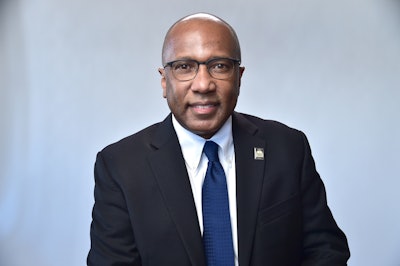Historically Black Colleges and Universities (HBCUs) are safe spaces for personal development. Attending HBCUs provide intentional, intrusive, and focused resources dedicated to its students’ academic success and mental well-being. HBCUs expose students to experiences that can’t be imitated, accepting students as they are—nurturing and inspiring the whole person for academic and career readiness.
And they have been inclusive from the start, accepting all students eager to learn and grow regardless of race or economic status. It is truly the essence of their existence.  Dr. Harry L. Williams
Dr. Harry L. Williams
They continue to be essential beacons of higher education for the talented students who attend them. Not only do HBCUs enroll twice as many first-generation, low-income students, but they also outperform peer institutions in improving the economic standing of their students.
Like many students, they need support, and that’s where the tireless work of Thurgood Marshall College Fund comes into play, which is more critical than ever following the disappointing Supreme Court decision regarding affirmative action recently.
While that decision goes counter to the countless battles for human rights and equality that Justice Thurgood Marshall fought during his distinguished career, TMCF’s resolve is stronger than ever as it continues to champion ambitious students, create an equitable society, and provide pathways to social and economic mobility for students from marginalized and under-resourced communities.
Supreme Court Justice Marshall believed that due to the legacy of discrimination in America, it should be a state interest of the highest order that Black Americans be fully integrated into every part of society. The Supreme Court decision to remove race as a consideration in college admissions is an unfortunate step backward in the journey to create equal opportunity for everyone in America.
The Supreme Court decision highlights how critical the mission of the Thurgood Marshall College Fund is as it continues to work to create an equitable society.
TMCF is an expert force in educational equity, making higher education more accessible and creating opportunities for generations of students systematically excluded from most of America’s key institutions.
The significance of TMCF’s work is it helps students of the 47 public Historically Black Colleges and Universities and six Historically Black Community Colleges it serves by preparing students for success through curated programming and scholarships.
Since their founding with Cheyney and Lincoln Universities in Pennsylvania before the Civil War, HBCUs have transformed America, provided opportunities for Black students to receive a quality education, and established themselves as community anchors.
Throughout their history, HBCUs have been engines of economic empowerment and transformative in playing an outsized role in society by fostering personal and professional growth, promoting social justice, and empowering individuals to become game changers in the world.
Although they represent only three percent of higher education institutions, HBCUs produce nearly 20 percent of Black college graduates. Here’s further proof of the impact of HBCUs in the world. HBCUs produce 40 percent of Black engineers, 40 percent of Black Congress members, 50 percent of Black public-school teachers, 50 percent of Black lawyers, 50 percent of Black doctors, and 80 percent of Black judges.
HBCUs remain beacons of opportunity, light, and inclusivity, offering tremendous and one-of-a-kind experiences for their students where ideas are valued, and voices matter.
They still do.
They still matter.
This is a significant moment in TMCF’s history, and it is rising to the challenge of changing the world one leader at a time with innovative initiatives. During 2022, TMCF provided programming for 1,226 first-generation college students, a number that will increase in 2023 after hosting its first DevCon Professional Development conference in Charlotte at the end of May, which featured over 200 HBCU students.
Curated opportunities like DevCon are the essence, spirit, and soul of TMCF’s overall mission.
DevCon increased TMCF’s capacity to identify and develop high-potential talent. Leveraging an early talent model, the program equipped students with fundamental business skills and professional competencies through leadership development, career readiness, and targeted tech upskilling; while providing a pipeline of talented HBCU students to corporate hiring managers seeking to advance their equity, and inclusion goals.
TMCF advocates for policies and initiatives that benefit HBCUs and the students they serve. By working with government agencies, policymakers, and corporate partners, TMCF strives to increase funding for HBCUs, improve educational resources, and address the unique challenges faced by the institutions. This quality work is another reason why TMCF’s work matters more.
With its proven track record of assisting more than 300,000 students since its founding in 1987, TMCF’s efforts help reduce the barriers to education and amplify the voices and interests of HBCUs while collaborating with corporations to provide mentorship opportunities, internships, and professional development resources.
TMCF’s work matters more because, in addition to providing critical support for HBCUs and HBCCs, advocating for their interests, developing leaders, and creating an equitable society, it honors the legacy of Thurgood Marshall.
Dr. Harry L. Williams is President & CEO of the Thurgood Marshall College Fund.






















